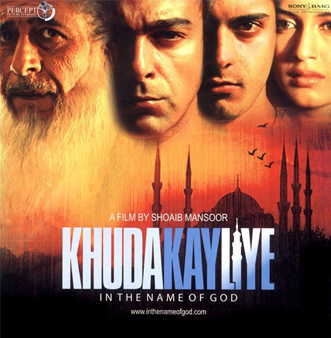Continuous manipulation and the situational transformation of a man into a distorted aberration of his self is not a rare concept. Quite recently when John Abraham’s quite a commercial film delved into this commonplace idea, my mind raced through all the films that have portrayed circumstantial transformation of people. While most plots are resultant of victimization at some level, glimpses of a singular film persisted in my mind all through.
It was the first Pakistani film to release in India in more than four decades. Shoaib Mansoor’s Khuda Kay Liye travels through the risky terrain of Islamic Fundamentalism and the dichotomy between the rightists and the progressive vein of thoughts.
The issue of manipulation into ‘crime’ comes when a young musician is brainwashed into believing music is sinful (haraam) by a Maulvi. The story that is set posh Lahore, tracks the story of two brothers and how Islamic fundamentalism shatters their happy bubble of music and mirth!

While one, brainwashed by a cleric, understands a ruptured and misunderstood version of Islam, the other is entrapped in the Muslim plight that followed 9/11. The younger brother detached from his morals and music, forcefully marries his cousin, rapes her and gets her pregnant. The young woman, a fierce London bred young girl, holds her patience and strength and eventually manages to escape. Waging a war against the atrocities meted out to her, the track is gritting and enlightening! Meanwhile, the older brother who moves to U.S.A as a music student falls prey to racial profiling! Brutally mishandled by the American Police, framing him to be a terrorist on most illogical grounds, his deportation back to Pakistan as a mute, challenged man is painfully heartbreaking.
The most enchanting part of the film is the direct court room confrontations on two most drastic and stark point of view revelations on Islam. While one Maulvi, places women and music is derogatory plains, another presents a wonderful counter argument quoting the Holy Quran vastly to make points defending Music and women empowerment in the religion’s premise.
The small role played by Indian actor Naseerudin Shah as the Maulvi who rectifies the misunderstood connotations of Islam that is handed out to people, he captures the gist of the entire film in his little role that obviously is the film’s pivotal standout point. Vicious misinterpretations that lead to issues as grave as lower position of women in Islam and gives rise to plagues like International terrorism, the film ends on an affirming note that keeps alive the cloud of hope in those who watch it.
Shootout at Wadala, a shabby commercial disorder, though steadily doing excellent business at the box office and bears no resemblance to the recommended film, the inevitable point that evolves is terrorism, crime and misdeeds result from victimization at some strata of society or other.
Fostering the themes of progressive thinking, secularism in a lucidly edited time frame, I recommend the film as an inkling of powerful thought served to you in a breathtaking story! It will make you abhor a lot of things in this world and teach you many more crucial and overwhelming lessons.



 Follow Us
Follow Us







